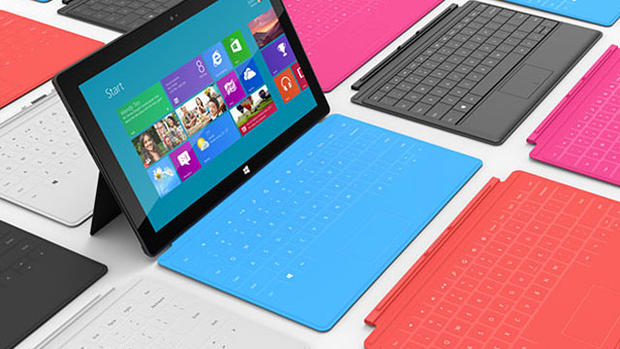4 ways Microsoft's Surface tablet could fail
(MoneyWatch) Microsoft (MSFT) has made its biggest bet in the mobile space yet with its newly announced Surface tablet. This is a make-or-break effort, challenging Apple (AAPL) and Google's (GOOG) Android on the consumer electronics front.
Success is anything but assured. Like all big bets, Microsoft's plans could go awry in a number of different ways. Here are some of the biggest dangers facing the company and what might be its last hope to keep from becoming increasingly irrelevant in the increasingly important world of mobile technology.
Throwing the gauntlet to its partners
Microsoft's success has rested on its partnerships with the biggest PC hardware vendors in the world: HP, Dell, Lenovo, Acer, Asus, and others. Since the 1980s, those manufacturers have put Microsoft operating systems on their computers, helping to make the software the most widely used of its type in the world.
Pictures: A closer look at Microsoft's Surface tablet
Microsoft tries to out-tablet Apple
7 reasons Microsoft's new tablet could worry Apple
But in recent years, the partnerships have become rockier. The vendors have created some products running other operating systems, such as Linux and Android. Now Microsoft has taken a similar step in creating competition for these same manufacturers. It may be that neither side sees a choice, but that still leaves a significant risk that a breakdown of the partnership could cause problems for Microsoft.
Not getting everything right immediately
Consumers have lost their patience with Microsoft, probably because they don't need to wait for what the giant does or doesn't do. There are many options on the market, including iPads and Android tablets. Microsoft needs to release something that will wow people from the start and not offer a vague promise of future improvement. Hitting the bull's eye is difficult and something that even Apple struggles to do. But Microsoft has to go even further because it is starting so far behind on tablets.
The support question
Unlike Google, which had no experience selling and supporting a retail product before it came out with its Nexus One phone (resulting in a disaster when it tried to do so), Microsoft has sold consumer electronics products before. In theory, the company knows what it takes to deal with consumers on this level. But there's a difference between swapping out hardware units of a game console like the Xbox 360 and the degree of support that is typically necessary for a computer. The more success, the greater the need to help users through their problems.
Cynicism
Perhaps Microsoft's single largest problem is the atmosphere the company has cultivated, whether intentionally or not, over the decades. The company's habit of introducing software before all the bugs have been zapped has convinced many tech aficionados to skip initial major releases of Microsoft software and instead wait for subsequent, cleaner versions. Forays into consumer electronics -- like the Kin phone or Zune music player that fell flat, or the massive hardware problems Microsoft has had at times with the Xbox -- have created an image of a company that can't shoot straight. Even if the software maker completely nails a tablet, there might be enough disbelief to keep many people from considering a purchase.
